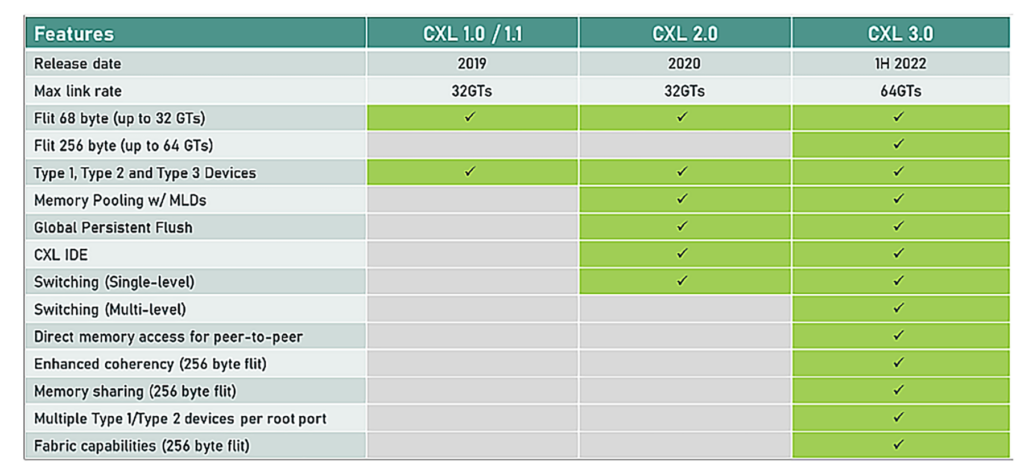Compute Express Link (CXL) Brings Memory Pools – Tech Field Day 27
Compute Express Link (CXL) is a new interconnect standard that promises to revolutionize the way data centers are built and operated. CXL allows processors, memory, and accelerators to communicate with each other at high speeds – from one machine – which can lead to significant performance improvements in a wide range of applications.
While in San Jose, I learned a lot more about CXL, and how memory pooling can create and adjust memory needs for each VM on the fly.
What is CXL?
CXL is a new open standard for high-speed, high capacity central processing unit (CPU)-to-device and CPU-to-memory connections. This is a consortium, led by Intel, to create a standard by multiple technology companies.
CXL is built on the serial PCI Express (PCIe) physical and electrical interface. This includes PCIe-based block input/output protocol (CXL.io) and new cache-coherent protocols for accessing system memory (CXL. cache) and device memory (CXL. mem).
Memory Pooling
The serial communication and pooling capabilities allows CXL memory to overcome performance and socket packaging limitations of common DIMM memory. The user can cluster memory so all of it gets used for their need.
Meanwhile, the physical motherboard memory can stay on task of controlling only the machine and overall operating system.
CXL was developed by a consortium of leading technology companies, including Intel, Google, Microsoft, and Alibaba. The consortium was formed to develop a standard that would enable the next generation of data center computing.
How does CXL work?
CXL uses a serial communication protocol that is based on PCIe. This allows CXL to achieve high speeds of up to 32 GT/s. CXL also uses a cache-coherent protocol that allows processors, memory, and accelerators to share memory resources without any conflicts.
CXL is a scalable protocol that can be used to connect up to 4096 devices. This makes it a good choice for data centers that need to support a large number of devices.
Why is CXL important?
CXL promises to revolutionize the way data centers are built and operated. It allows processors, memory, and accelerators to communicate with each other at high speeds, which can lead to significant performance improvements in a wide range of applications.
CXL is also important because it is an open standard. Companies can implement so they can build CXL-compliant devices that work for their needs. This will help to drive down the cost of CXL devices and make them more widely available.
What are the challenges?
One challenge is that CXL is a new technology and there is not yet a lot of experience with it. This means that there is a risk of compatibility problems between CXL devices from different vendors.
Another challenge is that CXL is a complex technology. This means that there is a risk of security vulnerabilities in CXL devices.
CXL is a promising a powerful technology that can have the potential to revolutionize the way your data centers are built and operated.
CXL 3.0 Specification

Currently, CXL Specification 1 and CXL 2 are available, and CXL 3 is in evaluation mode.
CXL 3.0 will utilize the sixth generation of the PCI Express standard (PCIe 6.0). It doubles the bandwidth of previous generations, to 64 GT/s. The specification is designed to support the increasing demands of high-performance computing, as well as artificial intelligence applications.
Sources – Learn more
- en.wikipedia.org/wiki/Compute_Express_Link
- Tech Field Day – CXL
AsteraLabs A1000

Astera Labs is a semiconductor company that provides connectivity solutions for intelligent systems. Founded in 2017, Astera Labs’ solutions are purpose-built to tackle bandwidth, capacity, and performance bottlenecks in data-centric systems.
One of their products I got to take a look at is the AsteraLabs Aurara A1000 – a PCIe x16 card for CXL 1.1/2.0. The card contains 4 slots for DDR5-5600 RDIMM modules and can be upscaled to 2TB.
The processor runs fanless, and the interface can run up to 32 GT/s per lane.
MemVerge
MemVerge is a company that provides software-defined memory solutions for enterprise customers. Memory Machine is a software platform that enables businesses to pool memory resources across multiple servers. This creates a large, persistent memory pool that can be used by applications to improve performance and scalability.
Memory Machine uses advanced memory virtualization techniques to provide high-performance, low-latency access to this memory pool, while also providing features such as snapshotting, cloning, and replication to help businesses manage their data more effectively. Memory Machine can be used with all of your Enterprise applications. This encompasses databases, analytics platforms, and AI/ML workloads, to improve performance and efficiency.
MemVerge’s solutions are designed to help businesses reduce infrastructure costs. This will improve application performance, and simplify data management.


![Showcasing-all-new-IntelliKit-image[1] IntelliKit](https://geekazine.com/wp-content/uploads/2023/12/Showcasing-all-new-IntelliKit-image1-394x330.png)
